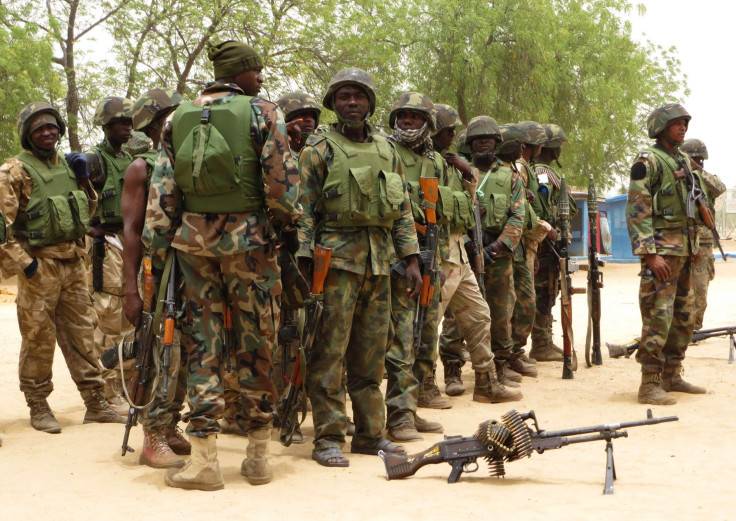After Baga Attack, Boko Haram Carves Out Vast Enclave That Extends To Cameroon And Chad

After a massive attack on the northeastern town of Baga, Nigeria, last week that left thousands of civilians dead, Boko Haram, one of the world's most violent Islamic extremist groups, now dominates most of the country's northeast area. And with control of two key border crossings, the group appears on the verge of international expansion.
Boko Haram, which the U.S. designated as a terrorist group in 2010, now controls the majority of Nigeria's Borno State and a vast swath of the country from Gombe to Baga. Its territory is nearly impossible to reach from the western part of the country, and Nigerian authorities are virtually invisible in the area. Cell phone service is down and few can access the Internet. Boko Haram's massive land grab gives it de facto control over possibly tens of thousands of Nigerians, and it's battled-hardened fighters are on the doorstep of Chad and Cameroon.
Marie Harf, a deputy spokesperson for the U.S. State Department, confirmed the Jan. 3 Baga attack was a "massacre of serious proportion" and that Boko Haram is in "operational control of increasing amount of territory."
Data compiled by the Armed Conflict Location and Event Data Project and analyzed by International Business Times shows that between Jan. 1 and Jan. 10 Boko Haram killed 2,184 people. At least 1,700 of those were residents of Baga. The Nigerian government, however, has claimed that only 150 people were killed. It is almost impossible for news outlets to grasp the scale of the attack because of the lack of information. As of Jan. 14, there were no satellite images from Airbus Defense and Space that showed the town of Baga or its surrounding area. The last photos of the northeastern part of the country were taken last year.
On Wednesday, Human Rights Watch released a report that said it had gained access to satellite images that showed "direct evidence of extensive areas of fire-related damages to local buildings and trees, consistent with a systematic campaign of arson directed against the civilian population in the area."
The group infiltrated Baga several times since 2010, but the Nigerian army, along with forces from Niger and Chad, had prevented the militants from taking over completely. Last week those military forces were overrun and abandoned their base in Doro Gowan, leaving thousands in the region to fend for themselves.
Residents of Baga told local Nigerian media outlets that after overrunning the military base in Baga, the militants attacked the village from two sides. Some drove pickup trucks armed with heavy machine guns into the center of the town, while others attacked from the banks of Lake Chad. Tens of thousands of residents managed to escape before the militants entered the village. Some fled to Chad, while others went to the town of Maiduguri, a 40-hour walk from Baga.
Doctors Without Borders said this week that it has a team in Maiduguri assisting survivors of the massacre. In a statement, the aid organization said 5,000 survivors of the attack are staying in a camp in Maiduguri known as “Teacher Village." The organization estimates that the total number of displaced people in the Maiduguri area after the attacks last week is now around 500,000. Ten percent of those people are in camps that were set up beginning in July. Others have settled on the shores of Lake Chad and some are still thought to be living in the village.
“Because of the volatile situation in Baga, [our] teams are currently unable to reach the area to assess people’s medical and humanitarian needs,” said Isabelle Mouniaman-Nara, head of the group’s programs in Nigeria, in a statement. “For now, we will continue to respond to the needs of the displaced people in Maiduguri.”
That means that for the perhaps thousands still living in Baga, there is no government agency or international aid group that can help them.
The National Emergency Management Agency, a Nigerian government aid group, has also dispatched a team from Abuja to assist the displaced. But the group is only operating in Maiduguri. Over the weekend the organization registered 3,200 people from Baga.
Baga is a part of Nigeria's Borno State, which is nicknamed in Nigeria as the "Home of Peace." But the region has experienced some of the most intense Boko Haram violence since the terrorist group began its campaign to form an Islamic caliphate in 2009.
The group has never set its sights on controlling territory outside Nigeria, but over the past year it has seized land in the northeastern part of the country that solidified its control there. Not only has it seized land from areas in the north, it has terrorized the residents living there.
In April, the terrorist group kidnapped more than 200 girls from a school in Chibok in Borno State. The group is still holding them, but their location is unknown. Mia Bloom, a terrorism expert at the Center For Terrorism and Security Studies at the University of Massachusetts in Lowell, said some analysts have speculated that recently the group used two of those girls, as young as 10, in suicide bomb attacks at a marketplace in the northeastern part of the country.
Aid organizations on the ground in Borno state are still trying to gather information about the scale of Boko Haram's control. Doctors Without Borders told International Business Times that the situation on the ground was fluid and changing by the hour.
© Copyright IBTimes 2025. All rights reserved.





















